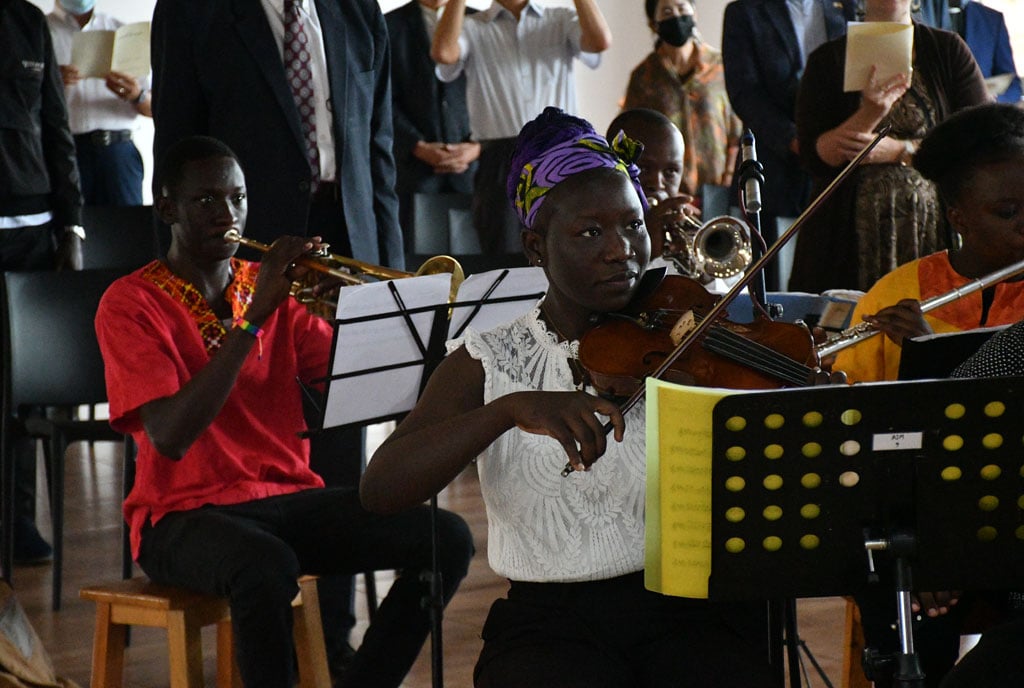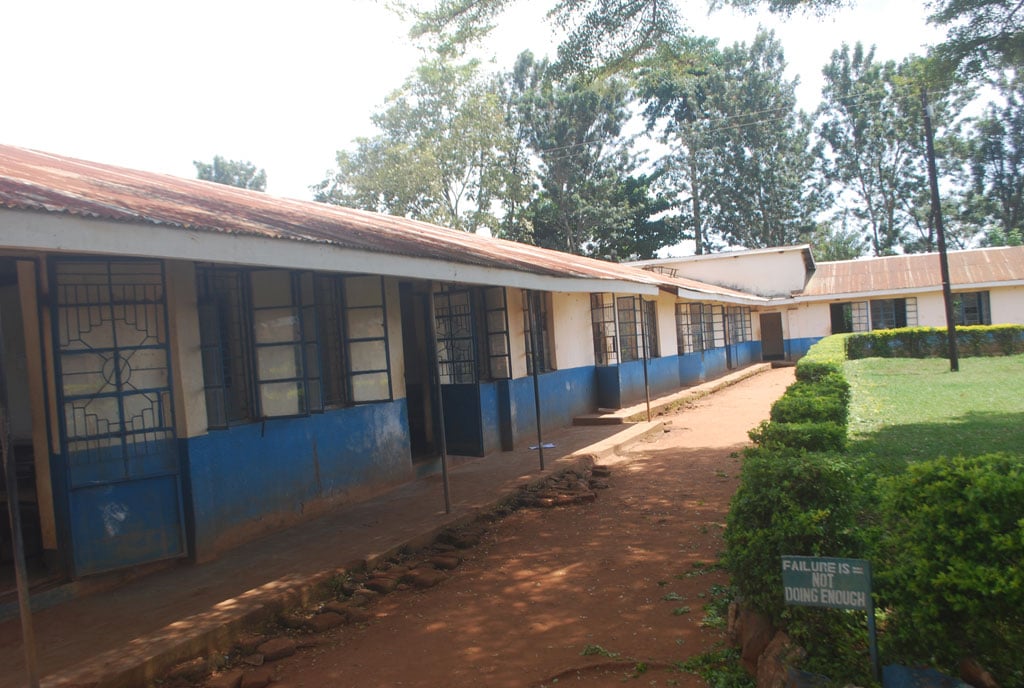20 years of teaching music

Students perform at the celebrations to mark 20 years of African Institute of Music in Lubowa, off Entebbe Road recently. PHOTO/EDGAR R BATTE
What you need to know:
- When Maria Park Kim and her husband Sunghwan, Korean American missionaries came to Uganda in 1994, they first volunteered as teachers of music until they realised the need to set up a bigger place to offer professional music courses.
- African Institute of Music was born and they celebrated 20 years recently.
Uganda’s entertainment industry contributes about Shs140bn –or about 0.3 percent - of the service sector in the country’s Gross Domestic Product (GDP) and about Shs47.1 trillion to Uganda’s economy.
It employs more than 500,000 people as musicians, dancers, actors, comedians and DJs. It is a field where graduates never fail to get jobs. The entertainment industry is one of the biggest paying careers or talents in Uganda today.
Notably, talent is born and not many go to school to study music, which majorly anchors Uganda’s arts or entertainment sector.
Twenty years ago, Dr Maria Park Kim along with her husband, Sunghwan, Korean American missionaries living in Uganda, started the Africa Institute of Music (AIM) to cognitively stimulate those who chose to learn and practice music at a professional level.
The two decades of existence were marked with an exhibition of admirable musical offerings by the students and teachers, including the Ngoma ya Mungu: African Ensemble and Africa Phil & Choir whose multimusic disciplinary fusions left guests entertained.
Reshape culture
As such, the story of the institute is one of special interest because of music and its important place in our lives, reflecting and reshaping culture.
“In today’s world, with unpredictable dramatic events and unexpected diseases, music that touches a person should thrive. It is time to renew our minds and hearts and reflect what is truly needed in a human’s life? Let our education speak rather of craftsmanship, creativity, artistry, originality, integrity, which leads to satisfaction in truth,” Park Kim noted in her speech at the celebrations at the institution based in Lubowa off Entebbe Road.
The takeoff
The initial mission of the couple, when they started the institute was to support other higher learning music institutions.
“There was only one such tertiary institution back then [in 2002] that offered a music programme and we gave a hand by lecturing there. Some other institutions began the programme, and we helped them in designing their curricula, while training church musicians at the AIM centre,” she recollected.
The training of music ministers grew meaningfully and became the foundation of the AIM’s tertiary education.
In 2010 AIM registered with the National Council for Higher Education, and in 2021, a license of the Other Degree Awarding Institution was granted.
“You chose a unique field, which very few institutions in Uganda are offering (music education) and not many are yearning to offer. And yet music is an interesting discipline for many people and more so for the youth. AIM is, therefore, providing a precious opportunity for our youth to acquire professional music as well as entertainment skills. It is a gateway to a self-employed career,” explained Prof Mary Okwakol, executive director of the National Council of Education during celebrations to mark 20 years of the institute’s existence.
Rebecca Nakalema joined AIM as a music minister for a Diploma in 2006. During her second year, she started working as a part-time administrator for Young Musicians Academy (YMA), a programme for individual lessons.
“I had completed a Diploma in Education at Nkozi National Teacher’s College (NTC) and Music was one of the subjects I majored in. When I joined AIM, I found out that I had not learned much from the NTC.
In 2007, I took my first trip to Korea with other students as Ngoma ya Mungu, a troupe that the school started. At AIM we got to study our ethinic music in a way that we got to appreciate,” says Nakalema.

Two years later, she joined the three-year Bachelor’s programme.
“With the help of our principal, Dr Maria Park Kim, I learnt a lot and discovered that my interest in music was choir conducting which I later pursued at Master’s level in South Korea in 2015. I am a choir instructor and academic registrar at AIM,” she says.
Popularising the art
Bernard Bashaasha, the chairperson of the governing council of Africa Music Institute commended the founders of the institute for fundamentally transforming the music education landscape in Uganda.
“We also thank the Kims for discovering the music potential of Ugandans and electing to invest in the development of musicality here. From humble beginnings in a rented house in Muyenga to this beautiful, spacious, leafy campus here in upscale Lubowa-Ebenezer indeed,” he added.
Prof Okwakol adds that it is noteworthy that music education in Uganda has not been prioritised by many institutions because it is seen as a talent which does not require formal qualifications.
“It is perceived that there are few employment opportunities for graduates and there is a lack of music trainers or instructors. Further, the attitudes of the public who think that it is for academic failures make popularisation of this discipline difficult,” she observes.
Ritah Aool, a former student, says every musicians’ experiences an extremely important moment when they fall in love with music for the first time.
“As I listen and move to the music,sing,compose and play,the music fades as I walk away and seems to disappear, but it lingers in my head and pairs with my surroundings.
AIM has offered me a platform of self-expression through music, healing but above all emphasising it for the glory of God often dictating how I as an individual take a step to impact society.
Professional training
The institute which teaches students physically and online, houses a performing arts centre, prestigious schools, and ministerial places.
Prof Okwakol argues that that is partly because there are musicians and actors who do things with little or no ethical consideration, the dress code is wanting and the language used by some is vulgar.
As a result, a number of parents discourage their children from pursuing it as a profession.
“I am convinced that AIM is professionalising the career by instilling discipline and values in the learners in keeping with one of your objectives which is - raising responsible and innovative individuals by exposing them to the spirit of discipline. You have maintained your culture and niche as per your name by mounting only programmes that speak to your vision of becoming the leading arts institution of holistic and artistic music education that appreciates the unique musical identities of students. Please stick to your vision in order not to lose your identity,” she added.
As part of activities of the institute’s 20th anniversary, the founders, Prof Okwakol and consul Park Sung-Joon from the embassy of the Republic of Korea, planted a tree at the institute before a meal was shared.
Courses offered
Bachelor of Music
Worship MinistryJazz and Contemporary Music Performance
Classic Music Performance and Composition
African Music Performance
Music Production and Sound Engineering
The two-year Diploma programme in;
Worship Ministry
Contemporary Performance
Jazz/ Classical Performance
Music Production
African Music Performance
plus a two-year Certificate programme in Music





